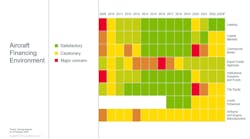Washington, DC, Feb. 3, 2016 – Following today's introduction in the U.S. House of Representatives of a bill to reauthorize funding and programs for the Federal Aviation Administration (FAA), the National Business Aviation Association (NBAA) reiterated its long-standing opposition to the creation of a privatized air traffic control (ATC) system, funded by user fees, which is called for in the reauthorization bill.
Chairman Bill Shuster (R-9-PA), who leads the House Transportation and Infrastructure (T&I) Committee, unveiled House Bill H.R. 4441, the Aviation Innovation, Reform, and Reauthorization (AIRR) Act of 2016, to reauthorize FAA funding and programs beyond the current expiration date of March 31, 2016. Introduction of the measure follows remarks by Shuster indicating his intent to create a new, privatized aviation system – separate from the FAA, and not subject to congressional oversight – funded by user fees.
As he has repeatedly done since Shuster first announced his intentions, NBAA President and CEO Ed Bolen called ATC privatization funded by user fees “a fatally flawed concept,” one contrary to long-held positions of the business aviation community, and at odds with the current construct for America’s aviation system, in which Congress ensures non-discriminatory access to the nation’s airports and airspace.
Bolen also noted that while steps appear to have been taken in the legislation to exempt some segments of general aviation from the user fees included in the bill, the debate over ATC privatization has always been about much more than user fees.
“NBAA opposes this legislation, which has been pushed by most of the big airlines, and is modeled on foreign systems that can be – and in many cases have been – harmful to general aviation, including business aviation,” Bolen said. “NBAA believes that the public airspace belongs to the public, and should be run for the public’s interest. Putting our nation’s ATC system beyond the reach of elected officials has the potential to not only harm general aviation, but also stifle innovation and new competition.
“There are better, more targeted ways to ensure the United States continues to enjoy the largest, safest, most diverse and most efficient air transportation system five, 10 and 20 years from now,” Bolen continued. “We do not need to take the risky step of turning our nation’s air traffic system over to a small group of self-interested industry stakeholders.”
Despite NBAA's opposition to the portion of the FAA reauthorization bill supporting a privatized ATC system funded by user fees, the association did welcome other provisions in the legislation, including those that NBAA had worked to see included in the measure. That said, the association asserted that while there are good elements to be found in the bill, the privatization plan represents such a significant threat for the future ability of business aviation to fly when and where it needs to, NBAA is left with no alternative but to oppose the legislation.
"We respect Chairman Shuster’s leadership on transportation issues," Bolen concluded. “As this debate continues, we want to find ways to work with the chairman and others in Congress to ensure that America’s aviation system continues to lead the world, and to serve all Americans, and not just a select few aviation interests.”


